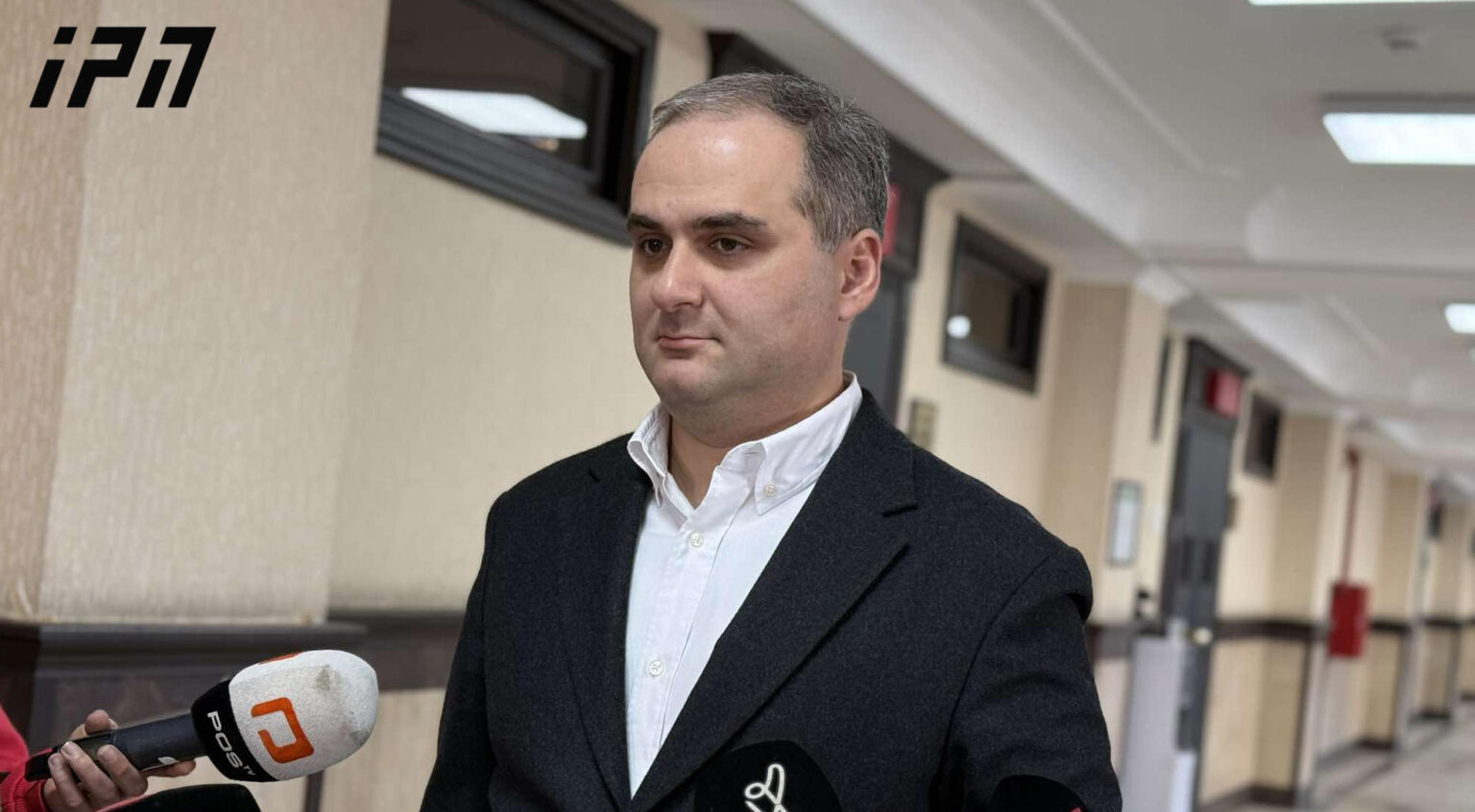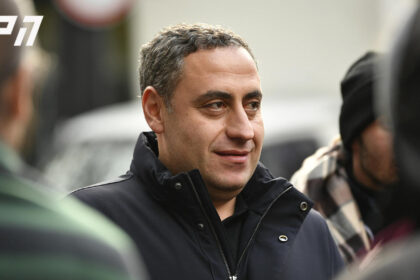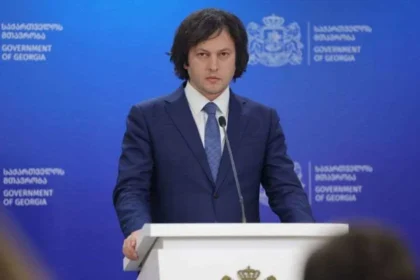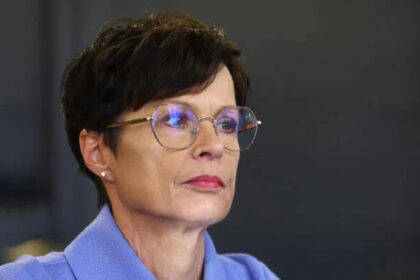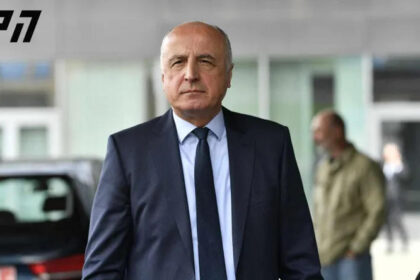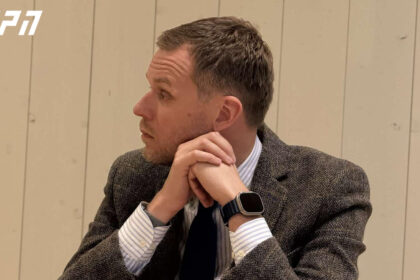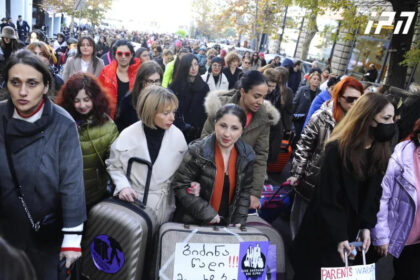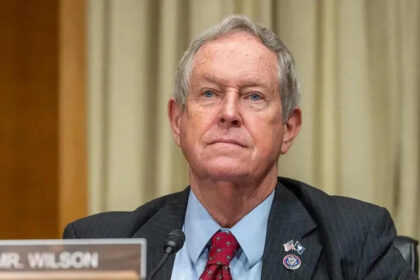The lawyer of Bidzina Ivanishvili, the founder and honorary chairman of “Georgian Dream,” Teimuraz Tsikvadze, has released a statement following the completion of the appellate court review in the case involving the illegal appropriation of a large amount of cryptocurrency belonging to Ivanishvili and the legalization of illegal income by Giorgi Bachiashvili, the former general director of the Co-Investment Fund.
As the lawyer writes, during the appellate review stage, the truth of the victim Bidzina Ivanishvili became even more evident and obvious, as did the correctness of his position, while on the other hand, the fact of the convicted Giorgi Bachiashvili committing an illegal act became even clearer.
“Following the completion of the review in the appellate court, I would like to once again provide explanations to the public regarding the case of Giorgi Bachiashvili’s illegal appropriation of a large amount of cryptocurrency belonging to Bidzina Ivanishvili and the legalization of illegal income. At the same time, I apologize to the public for the letter being quite lengthy. However, this was done deliberately on my part to explain the circumstances of the case in detail, making these explanations as comprehensible and understandable as possible for any reader, including members of the public without legal or economic/financial education.
On one hand, during the appellate review stage, the truth of the victim Bidzina Ivanishvili became even more evident and obvious, as did the correctness of his position, while on the other hand, the fact of the convicted Giorgi Bachiashvili committing an illegal act became even clearer.
In analyzing the review of the case at the appellate stage, first of all, I want to draw the public’s attention to the diametrical change in some of Giorgi Bachiashvili’s positions (compared to what he had during the investigation and the first-instance court review), which directly contradicted himself.
Bachiashvili’s main argument was the circumstance that, allegedly, after repaying the credit received for financing Bitcoin mining, he additionally handed over in cash to the bank’s administrator the benefit/interest that he had agreed upon at the time of issuing the credit. He substantiated this with the so-called calculation he submitted to the investigation (which detailed the rules for calculating the amounts and, accordingly, the quantity) and also by referring to the non-authentic audio recording he presented. In his opinion, the edited audio recording established that the victim Bidzina Ivanishvili agreed (as is evident and known to the public, the aforementioned audio recording does not contain any agreement from the victim) to issue the credit to him in exchange for providing certain benefits to the bank. In reality, the amount he handed over to the bank’s manager, at the time of transferring the funds, was qualified by him as the remaining profit after the completion of the deal, which belonged to the victim Bidzina Ivanishvili. Allegedly, nothing more remained after servicing the credit. Only after the investigation against him began did he re-qualify this amount as additional benefit in exchange for the bank issuing the credit. However, this is not the main point.
During Bachiashvili’s questioning at the appellate review stage (which the defense side requested), when asked whether he handed over cash to anyone after repaying the credit, whether he had any conversation with the bank’s representative about additional benefits for the bank, he replied that no, he had no such agreement with anyone and, accordingly, had not handed over cash to anyone! Then, after he was offered an additional examination of the documents/calculations he himself submitted, as well as citations from his testimonies/interrogation protocols, he categorically refused both the examination of the documents and the citation of his testimonies or explanations given during the investigation and the first-instance court review. It should be emphasized here that in the appellate complaint, among other things, he was appealing the first-instance court’s decision that denied him the publication of his testimonies. At the appellate review stage, he essentially rejected both the aforementioned demand in the appellate complaint and his corresponding testimonies or explanations given previously. By this action, he contradicted himself and his essential position, on which the defense had relied throughout this period.
In this situation, it is clear that any explanation or position of the convicted Giorgi Bachiashvili is completely devoid of credibility and constitutes a lie,” the lawyer writes.
In addition, the lawyer notes that Bidzina Ivanishvili is demanding the cryptocurrency belonging to him that was illegally appropriated by Bachiashvili, and the convicted has presented nothing to counter these circumstances, as it is impossible.
“Another important issue discussed at the appellate stage concerns the convicted Bachiashvili’s admission, which confirms that if he can be considered an investor in the Bitcoin mining deal at all, it is only within the limits of the 1,305,000 USD that he mobilized, and not in the 5,000,000 USD portion, which was Bidzina Ivanishvili’s investment in the mining contract.
Specifically, in correspondence conducted via email with one of the cryptocurrency exchanges in 2016, the convicted noted that he had financed a Georgian Bitcoin mining startup (i.e., a new, inexperienced company), and his participation amount/volume was within 1,500,000 USD. This directly refers to the company that also received Bidzina Ivanishvili’s investment through the issuance of a bank credit in the amount of 5,000,000 USD. In other words, the convicted directly admits in official correspondence related to anti-money laundering procedures (‘AML/KYC procedure’) what the victim side claims: that Bachiashvili is not an investor in the 5,000,000 USD portion.
Bachiashvili tried to justify this by saying that the startup company is a separate legal entity, and in the correspondence, he was allegedly communicating with the cryptocurrency exchange representative only about his own finances. This lie also proved short-lived, because the case materials include other evidence, including correspondence conducted via email in 2017 (i.e., after the convicted had already confirmed his participation volume in the mining deal in 2016) with the same cryptocurrency exchange, where Bachiashvili explains that he has not separated his personal and the company’s finances and that he and the company should be considered ‘as one’ in terms of the source of finances. From this, it is evident that the aforementioned evidence directly and unambiguously confirms (and Bachiashvili himself does this) the fact that Bidzina Ivanishvili was the investor in the 5,000,000 USD portion issued as a loan from the bank.
I believe that the above circumstances are absolutely sufficient for the public to form a correct understanding of the disputed issues and to be convinced that Bidzina Ivanishvili is demanding the cryptocurrency belonging to him that was illegally appropriated by Bachiashvili. The convicted has presented nothing to counter or invalidate these circumstances, as it is impossible. Therefore, being in a difficult situation, without legal and factual grounds to confirm his position, Bachiashvili is trying in every way to go beyond the legal framework and build his so-called defense strategy on statements with political content. He also relies on alleged ‘moral grounds’ (a man who goes to another person to ask for a credit and records that conversation!) to prove that he was entitled to the credit from Bidzina Ivanishvili and that he is now ‘being punished’ because of his political views. From this ‘series’ are statements related to the fact that he allegedly refused anti-Western rhetoric, supports the Ukrainian state, and is supposedly being punished for that. Also, statements that the ‘German conclusion’ he presented about the audio recording, as well as Bidzina Ivanishvili’s alleged failure to answer questions, supposedly confirmed the correctness of his positions.
From this, despite the fact that we have explained the actual situation in detail to the public on the aforementioned issues, I will once again briefly address the convicted Bachiashvili’s so-called arguments,” the lawyer writes.
In addition, the lawyer discusses the statement by Giorgi Bachiashvili, the former general director of the Co-Investment Fund, where Bachiashvili notes “that he refused anti-Western propaganda, which Bidzina Ivanishvili considered betrayal.” According to the lawyer, Bachiashvili’s statement that the victim demanded he engage in anti-Western rhetoric is absurd.
“He has presented no evidence to confirm this, as such a thing does not exist in nature. Clearly, such a statement has no legal weight; it may be considered by the convicted as a kind of ‘strategic’ move, where the main thing is to voice certain disinformation, which can be used in various ways to shape public opinion (despite the fact that we are dealing with a very low-level manipulation) and ultimately help achieve the criminal’s goals (i.e., we are facing only ‘naked PR’ that needs informational support for dissemination). Leaving aside the absence of evidence, for any thinking person, how can it be convincing that Bachiashvili, whom no one knew before the criminal prosecution began, who has neither academic knowledge in politics nor practical experience, would be used by anyone for certain political agitation? It should also be taken into account that Bachiashvili’s ‘tactics’ were constantly updated throughout this period, and this unfounded position was later ‘thrown in’ by him into the case.
Equally unfounded lie is that he is allegedly being criminally prosecuted for expressing sympathy or support for the Ukrainian state. I have already explained to the public earlier that Bachiashvili was never interested in politics and did not express his political views. He did not attend even one political gathering until he deemed it necessary to somehow discredit the ongoing investigation against him. From this, it is evident that Bachiashvili’s ‘sympathy’ toward anyone or anything is facade-like, a phenomenon caused only by his personal interests. No one has seen, and Bachiashvili has not presented any evidence, that before the investigation began, he carried out any politically active action. Accordingly, in this case too, we are dealing with ‘strategic disinformation’ that has no connection to justice or law,” the lawyer writes.
In addition, the lawyer explains that it is also a lie that Bachiashvili allegedly performed secret and at the same time risky tasks for Bidzina Ivanishvili.
“As I noted above, even the once ‘sensational’ and ‘exclusive’ audio recording, which the convicted disseminated in the public space at the time, was devalued by Bachiashvili himself, in the sense that he completely denied the existence of the fact (handing over cash to the bank’s administrator) that he was trying to confirm through this recording.
Even from the non-authentic/edited audio recording (on which the ‘German expertise’ could not exclude traces of manipulation, could not determine the time of its creation, nor the number of participants), the following is revealed:
1) Bachiashvili does not have the credit approved; 2) The bank refuses to issue the credit to Bachiashvili, especially considering that it would involve issuing an unsecured credit for extremely risky activity; 3) It is unacceptable for Bidzina Ivanishvili to order the bank’s administrator to issue a credit to another person; 4) There has been no case where Bidzina Ivanishvili, as a shareholder/beneficial owner of Bank Kartu, has acted as a guarantor for a third party (i.e., secured a credit for another person in ‘Bank Kartu,’ except for himself or his family members). Given that the direct written evidence in the case confirms that Bidzina Ivanishvili secured the credit with his personal funds, his explanation reflected in the audio recording directly excludes that Bachiashvili was an investor in the portion of funds issued from ‘Bank Kartu’; 5) Bachiashvili has already paid a certain amount into the Bitcoin mining (production) contract, at a time when he does not have approval for the credit. In this regard, it is noteworthy the position fixed by the defense side at the appellate review stage, that the interest of the company implementing the mining was to receive in advance the full amount provided for in the mining contract (6,305,000 USD), i.e., not to wait for Bitcoin production and to conduct mining for others at a wholesale price. This directly confirms that in the absence of investment from Bidzina Ivanishvili, the mining contract/deal would be called into question (as the contractual amount would not be fully filled), and any reasoning to the contrary is erroneous; 6) By emphasizing the payment of part of the amount in the mining contract, Bachiashvili is trying to obtain unconditional consent from Bidzina Ivanishvili for issuing the credit to him, providing him with false information, as if investing money in Bitcoin mining is the same as purchasing solid securities, and his personal participation represents a kind of security, which is obviously absurd; 7) Despite the accused’s attempts, Bidzina Ivanishvili does not give any consent or promise to Bachiashvili for issuing the credit. To revisit the issue, Bidzina Ivanishvili refers Bachiashvili to the bank’s director.
In fact, this is the full content of the edited audio recording, and it is unimaginable that an objective evaluator would assess this as confirmation of Bachiashvili’s investor status.
It is noteworthy Bachiashvili’s response fixed during the appellate review to the question of what would happen in the event of ‘default’ (failure of the mining deal). During the investigation stage, regarding this, he stated that he ‘would do something,’ while in this case, he directly explained that in the event of severe consequences, the risk would be on the bank’s side (this is also a direct admission that he himself was not the risk bearer), and as an example, he cited mortgage credits, which is absurd. It is universally known that a mortgage credit is secured at least by the purchased immovable property, and in some cases, in the event of default, enforcement may apply not only to the purchased immovable property but also to the debtor’s other assets.
According to Bachiashvili’s logic, it turns out that if the mining deal were successful, he would express gratitude; in case of failure, he might apologize for the unreasonable project, and that would exhaust his responsibility. It would be exhausted because, as I have explained multiple times, he did not participate in the structure of the borrowing company (he only appeared in 2017, one year after the credit repayment), did not bring the funds needed for the investment, did not provide any security for the credit, and did not take any risks upon himself in case of default. This is an essential issue to determine who was actually the investor in the 5,000,000 USD portion. And it is already well known to the public that the allocation of funds for the investment in the form of credit, securing this credit, and taking the full risk was carried out by the victim Bidzina Ivanishvili.
Therefore, considering the weak position, the defense side/convicted could not even manage to ask essential and important questions during the victim’s questioning procedure and ended the announced several-hour procedure in a few minutes. At the same time, the victim Bidzina Ivanishvili fully and exhaustively answered all the questions asked, including those that were not related to the case under review. As I noted in the previous letter, it is interesting whether the accused will ever publish the full recording of the victim’s questioning—we will not be against it, as it will once again reveal that he is lying.
Here, I would like to once again address the explanations made by Giorgi Bachiashvili during the investigation process regarding why he was entitled to an unsecured credit from the victim’s bank. Just like the statements about not implementing anti-Western rhetoric and being prosecuted due to political views, these explanations are not based on any evidence in the criminal case but represent an attempt to mislead the public through disinformation. During the investigation, in the process of giving explanations, Bachiashvili tried to present the issue in such a way that he was allegedly entitled to an unsecured credit both morally and according to the unhealthy banking practice allegedly established by Bidzina Ivanishvili. Giorgi Bachiashvili cited three reasons as the so-called basis for receiving an unsecured credit. Specifically: a) allegedly he had a low salary corresponding to a mid-level manager in the bank; b) allegedly he performed secret/risky tasks for Bidzina Ivanishvili; c) allegedly Bidzina Ivanishvili had established an unhealthy banking practice where his relatives or acquaintances received bank credits without security. None of the aforementioned so-called bases correspond to reality, and accordingly, the case materials confirm the opposite.
In the Co-Investment Fund, Bachiashvili was a manager whose salary was several times higher than, for example, the salary of the general director of ‘Bank Kartu.’ Moreover, he had the highest salary that top managers of leading financial institutions in Georgia had at that time. In addition to the salary itself, he received additional remuneration/bonuses, which clearly shows the groundlessness of Bachiashvili’s reasoning.
It is also a lie that Bachiashvili allegedly performed secret and at the same time risky tasks for Bidzina Ivanishvili. On one hand, such tasks did not exist in nature, as the victim’s activities were always related to open, transparent business. On the other hand, Bachiashvili himself was always only oriented toward his activities, a cautious person. Therefore, talking about some secret and risky tasks on his part is a lie and absurd. Clearly, he has neither named any such task nor presented any evidence during the case review process.
Another false circumstance that Bachiashvili appeals to is the allegedly unhealthy banking practice established by Bidzina Ivanishvili, where his relatives or acquaintances received bank credits without security. This lie was also revealed during the investigation process, as the investigation conducted by the prosecutor’s office and the obtained evidence unequivocally confirmed that over approximately a twenty-year (if not more) period, no business credit was issued without security to a third party and subsequently secured by Bidzina Ivanishvili’s personal property.
I hope that this letter will once again clearly show the public not only the lies and contradictory explanations spread by the convicted Bachiashvili at the appellate review stage but also the full picture regarding the dispute,” the lawyer writes.
Lawyer: Bidzina Ivanishvili is demanding the cryptocurrency belonging to him, which was unlawfully appropriated by Bachiashvili; the convicted individual has presented nothing to refute these circumstances, as this is impossible
